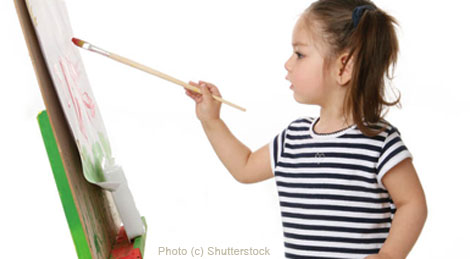|

Nurturing Creativity
By Wendy Priesnitz
I have long been interested in creativity – forming a broad-based definition of the term, understanding what makes some people live their lives more creatively than others, and discovering what conditions and traits optimize creativity and how it relates to learning (not to mention how to spark or revive it in myself). I believe that, although the “creative personality” is a complex one and some people have innate talent in certain fields, everyone has the capacity to be creative, or at least to think creatively. Furthermore, I don't limit my thinking about creativity to the arts.
Years ago, I began a list of things that nurture creativity. I’ve added and subtracted from it and had arguments about the validity of some of the items...as well as arguments about things I’ve left off.
What Supports Creativity?
My list includes what we might call personality traits. These include being comfortable breaking rules, taking risks, and dreaming big; curiosity and willingness to explore, ask questions, and seek new challenges; determination to create one’s own life on one’s own terms (which includes self-care); ability to focus; willingness to do hard work (which includes practice and routine); being comfortable with solitude; and bravery (which includes stubbornness in the face of criticism or failure). These are also what nurtures learning.
There are other, outward things on my list that support and enhance the creative experience. These include surrounding yourself with supportive people and avoiding negativity; having a “muse;” finding a stimulating “working” environment (Virginia Woolf’s room of one’s own, in my case); having the necessities of life; having recognition and acceptance in one’s chosen field. But I don’t believe these things are absolutely crucial to creativity. People who think and live creatively are found doing all sorts of work, living in all sorts of situations. Some have found fame in their creative expression; others haven’t. And many don’t seek it, preferring to use creativity as a life tool.
On my quest to understand creativity and learning, I’ve long enjoyed and been inspired by Julia Cameron’s bestselling Artist’s Way books. But more recently, I discovered Creativity: Flow and the Psychology of Discovery and Invention by psychologist Mihaly Csikszentmihalyi. He studied 91 creative and influential people, including novelists, playwrights, composers, musicians, scientists, actors, economists, and philosophers. And he concluded that creativity in any realm involves the same skill set: dedication, hard work, actively seeking new challenges, persistence, and boldness. Maybe I like this book so much because Csikszentmihalyi agrees with my thesis! “Each person has,” he says, “...all the psychic energy he or she needs to live a creative life.”
School-Free Kids and Creativity
So what is the difference between those who use that energy and those who don’t? And what does it have to do with learning? In my 45 or so years of observing kids who have educated themselves without attending school, I have noted that their lives are more conducive to nurturing creativity than those whose days are spent passively being told what to do, think, and learn.
They are also masters of play, which is, after all, their creative work. Play requires presence and engagement – two features of the self-directed learner. When one is fully and creatively engaged in a project, one doesn’t worry about the outcome or how others might judge it. That pleasurable experience is what Csikszentmihalyi calls flow.
Caught up in our results-oriented world, many adults consider play non-productive. We get so focused on getting things done and on doing them well that we rarely enjoy ourselves. And yet, in that exploratory, creative – playful – process, we are stretching ourselves and, as the life coaches put it, actualizing our potential. Paradoxically, our intense striving for perfection, to have it all, actually limits our potential.
What’s Important About Creativity?
For adults, maintaining an attitude of play and viewing problems from outside the box can be hard but important work. As I wrote in this article in 2010, creative thinking is one of the important things that leading edge employers are increasingly looking for, along with flexibility, adaptability, networking skills, research ability, motivation, time management, and entrepreneurial thinking.
So perhaps we should take our unschooled children as a model for our own lives. They live mostly free of adult-imposed structure. They are inherently creative. They explore, question, problem solve, experiment, focus and shift focus, make messes, take risks without fear of ridicule, make mistakes and try again. They apply what they have learned by moving around, talking, experimenting some more, thinking, jumping up and down...and sometimes appearing not to be doing anything at all.
These creative school-free children will be well-prepared to function in the new “real world.” By all accounts, the old industrial model of working and living is becoming outmoded and is taking the industrial model of passive, one-size-fits-all education with it. In the place of warehouse schools, a new mode of active, participatory, community-based learning is growing. And creativity is at the forefront of this new real world.
Resources
Walking in This World – The Practical Art of Creativity by Julia Cameron (2003, Jeremy P. Tarcher)
Creativity: Flow and the Psychology of Discovery and Invention by Mihaly Csikszentmihalyi (1997, Perennial Books)
The Creative Habit by Twyla Tharp (Simon & Schuster, 2003)
Wendy Priesnitz is Life Learning Magazine's editor. She is also a journalist with over 40 years experience, a former broadcaster, the author of 13 books, and a changemaker by nature. Her two adult daughters learned without schooling in the 1970s and '80s. You can learn more about Wendy and read some of her writing on her personal website.
|

